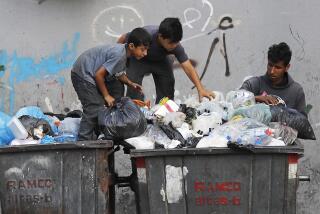Hard Times in Kuwait--Driving Last Year’s Mercedes
- Share via
KUWAIT — Strolling through Kuwait’s dazzling shopping centers, it is hard to imagine that this country is in a recession.
There are carefully coiffed women trying on $15,000 fur coats and diamond-studded watches, and children playing with the latest computer games and eating hot-fudge sundaes at American-style soda fountains.
About the only clue that not all is well can be found outside, where the lines of huge, gas-guzzling American and German cars now include a lot of last year’s models. In Kuwait, this is extraordinary.
Kuwait has the second highest per-capita income in the world (after the United Arab Emirates), measured by the United Nations in 1984 at $19,870.
Most Income From Oil
Nearly three-fourths of Kuwait’s income is from oil. The country has proven reserves of 69.44 billion barrels, or 10% of the world’s total--and this in a nation of only 1.46 million people, half of whom are imported laborers.
The crimp in the national economy was put there by a decline in the price of oil. Kuwait earned $18.4 billion from oil in 1980, but only $9 billion last year.
Also, the private sector was hit by a tidal wave of bad debts a year ago after the collapse of a stock market scheme based on the writing of post-dated checks. Investors, including a number of American banks that had lent money, lost a staggering $92 billion.
Still, most Third World countries would be delighted to have Kuwait’s financial problems--with oil to last 100 years, a rainy day fund (called the Fund for Future Generations) standing at around $35 billion and another $50 billion in cash reserves.
All this permits generous government spending. Kuwait makes available free medical care and education (including study abroad), heavy housing subsidies and electricity and gasoline at giveaway prices. The government even provided welfare payments to people who went bankrupt in the stock market crash.
But the oil money has not insulated Kuwait against the region’s upheavals. A year ago, car bombers attacked the American and French embassies here, and in May, Kuwait’s ruler, Sheik Jabbar al Ahmed al Sabah, narrowly escaped an assassination attempt.
The violence, rather than reflecting internal turbulence, is believed to have been the work of a group of radical Shia Muslims known as Al Dawa, based in Iran and determined to overthrow the government of Iraq. Kuwait has supported Iraq in its war with Iran.
Most Are Sunni Muslims
Most of Kuwait’s people are Sunni Muslims, about a third are Shia Muslims, and there have been reports that the government is cracking down on the Shias, particularly the foreign workers among them. About a thousand foreigners, mostly Shias from Lebanon and Iraq, have been deported in recent months, either because their papers were not in order or because they were politically suspect.
Kuwait has the region’s only functioning parliament and a thriving press that is among the most unfettered in the Middle East.
“We just have to learn to tighten our belts,” an American-trained banker said as he climbed into a gleaming Mercedes-Benz 500 and drove away from his beach chalet.
He was smiling. Dressed in the traditional loose robes, he had no belt.
More to Read
Sign up for Essential California
The most important California stories and recommendations in your inbox every morning.
You may occasionally receive promotional content from the Los Angeles Times.










